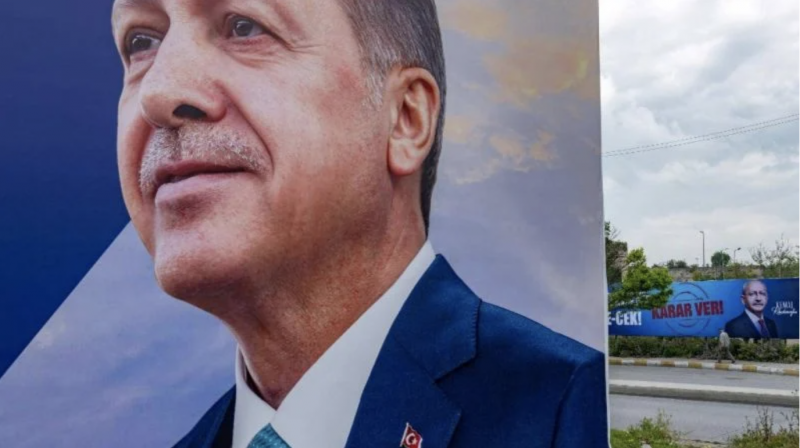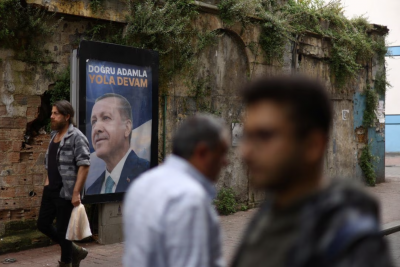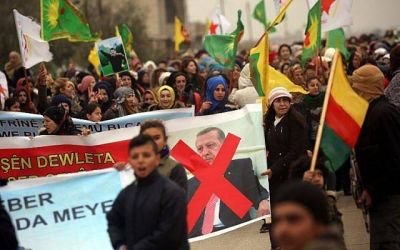
A campaign poster of Turkish President Recep Tayyip Erdogan, re-elected on Sunday, in Istanbul, May 23, 2023. (Credit: AFP)
In Europe, the United States, Russia, Syria and the Gulf... Turkey was not the only country facing the unknown in the Turkish presidential election runoff on Sunday.
Of course, there was little suspense as to who would win. Incumbent President Recep Tayyip Erdogan beat the odds in the first round by obtaining 49.52 percent of the vote, compared to 44.88 percent for his social democratic rival, Kemal Kilicdaroglu.
But beyond the expected re-election of the reis, this margin of victory is of great importance.
A weakened or emboldened Erdogan could have different impacts on Turkey’s foreign relations after it emerged from the isolation caused by its expansionist ambitions in Syria, Libya, the Eastern Mediterranean, the Caucasus and Central Asia— which provoked the ire of its NATO allies.
Today, the country can pride itself on having forged strategic alliances with various powers, playing a balancing act in the conflict between Moscow and the West, and re-established relations with Saudi Arabia, the United Arab Emirates, Israel and Egypt.
Unsurprisingly, Erdogan won 52.16 percent of the vote on Sunday, against 47.84 percent for Kilicdaroglu, according to nearly-finalized results.
“It seems that the vote for Erdogan has not changed much compared with previous elections,” said Cigdem Ustun of the Istanbul-based Center for Economics and Foreign Policy Studies and Research (EDAM). “In this context, we can expect him to continue his current foreign policy.” When Erdogan was re-elected in 2018 with 52.6 percent of the vote — a percentage close to Sunday’s results — his victory was more crushing because he had won without a runoff.
Sunday’s run-off signaled a setback for Erdogan. Nevertheless, the incumbent president “didn't win by a narrow margin, but rather by a comfortable one of up to four points,” said Soner Cagaptay, a Turkey expert at the Washington Institute.
“A narrow victory would probably have led him to modify his domestic or foreign policy in a more autocratic way. The status quo is to where we’re heading,” Cagaptay added.
Between Moscow and the West
Turkey’seconomic necessities will certainly play a role in Erdogan’s foreign policy choices.
On May 25, he declared that the Gulf states had sent funding to Turkey to help relieve the central bank, at a time when the country is caught in an inflation spiral.
“After Sunday’s elections, you will see how these leaders will come here and how I’ll visit them to show my gratitude,” Erdogan told CNN, building on the regional rapprochements of recent months.
QatariEmir Sheikh Tamim bin Hamad al-Thani was the first Gulf leader to congratulate Erdogan after his victory, followed by Emirati President Mohammed bin Zayed al-Nahyan and Saudi Crown Prince Mohammed bin Salman.
In recent years, several currency exchange agreements were concluded between Ankara, Abu Dhabi and Doha. “It is very likely that these agreements will continue and expand,” said Ustun.
Observers believe that the main unknown, in terms of foreign policy, lies in Turkey’s positioning in the confrontation between Moscow and the West over the war in Ukraine.
Since late February 2022, Ankara has positioned itself as an essential mediator on the Ukrainian issue thanks to its relations with both parties. While providing military support to Kyiv with its Bayraktar TB2 drones, Turkey also pursues economic cooperation with Russia.
“Turkey will continue to trade with Moscow, offering Putin and the Russian economy access to international markets and a holiday destination for oligarchs close to the head of the Kremlin on the Turkish Riviera,” said Cagaptay.
This is a game that could prove perilous “if the pressure exerted by the European Union (EU) and the US on sanctions increases, which is what we can expect,” added Ustun.
“With the EU, we can expect transactional relations in the future that will focus first and foremost on immigration and energy, because these are the priorities in Europe,” he continued.
F-16
Ankara has demonstrated its commitment to NATO by taking a politically strategic position regarding the Ukrainian issue. This was evident in its decision to close the Bosphorus and Dardanelles straits to the Russian navy at the onset of the conflict.
Turkey, above all, seems to be driven by its own agenda, demanding concessions on various issues such as the Kurdistan Workers’ Party (PKK) — which Ankara categorizes as a terrorist organization. Despite accepting Finland's application last March, Turkey still refuses to lift its veto on Sweden's bid to join NATO.
This refusal could potentially be used by Erdogan as leverage against progress in negotiations regarding Turkey's purchase of American F-16 fighter jets, especially after the Trump administration excluded Turkey from the F-35 program due to its acquisition of the Russian S-400 air defense system.
“The Turkish president could play Russia off against the US to get what he wants. His priority is to buy the F-16s and get a summit meeting with Joe Biden,” explainedCagaptay. “Erdogan will probably ask to visit him in the US before the start of the US election campaign, endorsing him as Turkey’s new sultan-president.”
In a tweet, the US president congratulated his Turkish counterpart, expressing his eagerness “to work together as NATO Allies on bilateral issues and shared global challenges.”
For his part, Putin told Erdogan that his victory was “clear proof of the Turkish people”s support for [his] efforts to strengthen the sovereignty of the state and pursue an independent foreign policy.”
Syrian-Turkish talks
The remaining uncertainties lie in Ankara’s stance towards Cairo on one hand, and the Syrian regime on the other. Syrian President Bashar al-Assad was recently welcomed back into the Arab fold, as evidenced by his presence at the recent Arab League summit in Jeddah, Saudi Arabia.
Despite ongoing discussions between Damascus and Ankara aimed at potentially normalizing their relations, both parties currently maintain a rigid and uncompromising stance.
According to the Syrian authorities, Turkey’s foremost obligation is to withdraw its support from the rebel forces it sponsors in northern Syria, who oppose the regime.
In response, the reis insists that Damascus takes action to combat the “terrorist organizations” present along its border, specifically referring to the People’s Protection Units (YPG), which is a key component of the predominantly Kurdish Syrian Democratic Forces (SDF) and allies of the US in the fight against Daesh.
“The Syrian-Turkish talks begun before the elections should continue,” saidUstun. The evolving relationship between Ankara and Cairo will be closely monitored, particularly since the two powers resolved their dispute following the rise of Egyptian President Abdel Fattah al-Sissi, who views the Muslim Brotherhood — backed by Turkey — as a threat to the Egyptian regime.
The two countries conducted their initial diplomatic meetings in early 2021.
Egyptian Foreign Minister Sameh Choukri traveled to Adana, in southern Turkey, after the destructive Feb. 6 earthquake to meet with his Turkish counterpart, Mevlut Cavusoglu.
Furthermore, on Sunday, the Egyptian presidential spokesman announced that President Sissi had sent a congratulatory message to Recep Tayyip Erdogan.
This article was originally published in French in L'Orient-Le Jour. Translation by Sahar Ghoussoub and Joelle El Khoury.

